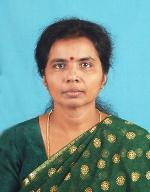 Dr.(Mrs) A. Nanthakumaran
Dr.(Mrs) A. Nanthakumaran
Department of Biological Sciences
University of Jaffna
Dr. (Mrs).Ananthini Nanthakumaran completed her Ph.D degree in Agricultural Economics under NCAS grant scheme at Tamil Nadu Agricultural University, Coimbatore, India in June, 2009. She is currently serving as Senior Lecturer in the Dept. of Biological Science, Faculty of Applied Sciences at Vavuniya Campus of the University of Jaffna in Vavuniya.
Her thesis titled “Management of Tank Irrigation with Groundwater Use in Tamil Nadu, India” under the supervision of Dr. K. Palanisami, Director, IWMI-TATA Water Policy Research Program, Hyderabad, India and former Director CARDS Tamil Nadu Agricultural University, India. The research was carried out with the overall objective of comparing the tank irrigation under different levels of well water supplementation using different typologies. The typologies could explain the adequacy of tank water for irrigation. Her thesis was identified as the best thesis and she won Dr.C.Ramasami award for the best Ph.D student-2010 for doing the research on Agricultural Policy, offered by Tamil Nadu Agricultural University, Coimbatore, India. The findings of her research are very much useful for the policy makers in Tamil Nadu State. The similar situation is in Sri Lanka and now she is in the process of applying her findings for the same situation in Sri Lanka.
Research Abstract of PhD
MANAGEMENT OF TANK IRRIGATION WITH GROUND WATER USE IN TAMIL NADU
The demand for agricultural products increases with increasing population over the years resulting in increased demand for both surface and groundwater. Among the surface water sources, tanks are facing more water shortages over years. As a consequence of the decline in tank irrigation, the land productivity is observed to be low under tanks compared to other sources of irrigation, indicating the poor performance of the tank irrigation systems in the state. Hence, it is important to find out alternate solutions to arrest or reverse the declining performance of tanks by supplementing with well irrigation. Keeping this in mind, the study was undertaken with the major objective comparing the tank irrigation in three different typologies viz., Tank only, Tank with wells and Wells only situations and the specific objectives are i) to study the general characteristics, water supply and income of the tank farmers under different typologies. ii) to measure the technical and allocative efficiency in crop production under different typologies, iii) to study the tank performance and the levels of farmers participation, iv) to study the water market and returns to supplemental irrigation in tank systems, and v) to identify the strategies for tank modernization options under increasing groundwater irrigation in the tank command areas.
The study was undertaken in three districts of Tamilnadu state, viz., Madurai, Sivagangai and Coimbatore. From the three selected districts, 30 tanks and 750 farm households were randomly selected for the study. The collected data were analyzed at tank level and at farm level using regression models, stochastic frontier production function and stabilization value model to fulfill the objectives of the study.
The water availability in the Wells only and Tank with wells situation was more resulting in improved tank performance. The Tank with wells and Wells only situations received more than 2.5 and 3.5 times higher income than from Tank only situation. Further, increasing the water supply by 10 ha-cm in Tank only situation will increase the labour employment by 4.3 mandays compared to 11.6 mandays in Tank with wells situation and 15.2 mandays in Wells only situation in a hectare of land.
Keeping the importance of groundwater in the tank system, the stabilization value was worked out, which is Rs.2,91,123. Thus keeping the balance of tank water and groundwater, the performance of the tanks could be stabilized. This justifies the need for additional investment in wells for supplementary irrigation in the tank command area. Also it is important to make investment in community wells to benefit the small and marginal farmers. The water users association in the tanks should be strengthened to manage the tanks and wells for better performance of the tanks.